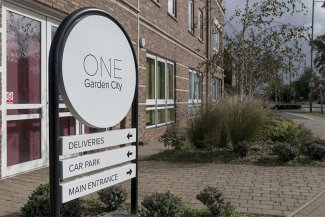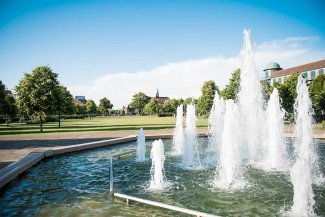At the end of 2017, we helped appoint a doctoral scholar as part of our work alongside the University of Hertfordshire at the International Garden Cities Institute. The placement has been co-funded by the University of Hertfordshire (UH), the Letchworth Garden City Heritage Foundation (as the ‘industry partner’), the Hertfordshire Local Economic Partnership (the ‘LEP’) and the European Regional Development Fund (the ‘ERDF’). In this blog we chatted to Amelie to find out more about her work.
Hi Amelie, nice to meet you. Can you give us a bit of background about yourself and what you’re doing in Letchworth?
I’m a French Urban Planner and Architect. I joined the Heritage Foundation in November as part of a studentship for doctoral research. My placement is co-funded by Letchworth Garden City Heritage Foundation (LGCHF), the University of Hertfordshire (UH) and the Hertfordshire Local Economic Partnership (Herts LEP).
The focus of my research is on the food economy in a Garden City context. The research aims to reinforce and improve a healthy and sustainable food economy in Letchworth Garden City. This is the first year of a 4-year journey, during which I will be working closely with the Heritage Foundation, to gain applied knowledge about the food economy in Letchworth.
What drew you to study Letchworth and what are you looking to uncover?
First of all, Letchworth is not your typical town. The history of the first Garden City is a tremendous asset for the study. I guess many of the residents of Letchworth know about Ebenezer Howard and his principles, following which the town was built in the early 20th century. Yet 100 years ago a lot of his proposals are still echoing and relevant to the present day in terms of quality of life sought.
For example, Howard proposed agrarian (crop) belts and plots of land available to grow food, ensuring the population had a reliable and local food source. Moreover, the notion of community has a remarkably central position in his text. As a result, in my research too, I’m looking at the food economy as seen through the eyes and the interests of the town’s residents. The study is not about changing the organisation of the food economy in Letchworth as community strengths and interesting partnerships do already exist. Rather, my research looks to highlight the food economy journey, who is doing what and to document their assets and their potential. This means for instance that we could then help connect different people who have the same interests in the food economy (growers for example) and to emphasise closer working opportunities.
What does your research actually entail? How do you conduct the research?
I am using a mapping software to design food-related maps, which display every food related stakeholder in Letchworth Garden City and the environs: farms, allotments, community gardens, restaurants, supermarkets, markets and mini-markets, pubs, bars, waste management disposals … Basically, every step connected with food. The mapping project helps locate entities geographically.
But even though mapping is a good tool to understand and encompass the wholeness of the food economy network, it hides some secrets, which I hope to find out after I survey the area on my bike. There is nothing better than to see and experience things first hand! I also want to meet and ask questions to the main stakeholders of food economy. This is actually a major part of the research: people’s experiences and knowledge are central to bring different perspectives together and bring up issues not perceptible on maps. For instance I’ve taken part in several events in Letchworth and met very interesting people. Later in the study, within a year or so, I want to send questionnaires to gain a broader insight from the residents. Finally, I also take the time to stay informed about what is going on elsewhere regarding food policy, governance, and organisation in cities in the UK and around the World: I read scientific articles, consult websites about food economy and environment, I dig in the archives of the Letchworth Garden City Collection.
Any interesting findings so far you could share? What will you be doing next?
Well, it’s the start of a long journey! Rather than proper findings, I have exciting threads I want to pull on! The venture needs to be continued. I’ll be analysing the data collected and my next step is to report to the University and to the Heritage Foundation on what I’ve learnt.
At the end of this year, in October, I will give back two different documents, one for the University with a more theoretical and academic content, and one for the Foundation, which will include the practical findings and hopefully recommendations for the Garden City food economy to look at now and in the future. A public presentation will also be organised where I will talk about the work and progress made during this first year. This will be a good opportunity to advertise the study, interact with people, hear different point of views and I look forward to working more on this in months ahead.
ACKNOLEDGEMENTS
This four-year doctoral research follows a Knowledge Transfer Partnership programme the first year, called Hertfordshire Knowledge Exchange Partnership (HKEP). It is co-funded by the University of Hertfordshire, the Letchworth Garden City Heritage Foundation (LGCHF) and the Hertfordshire Local Economic Partnership (Herts LEP). Part of the latter’s funds comes from the European Regional Development Fund (ERDF). The LGCHF contributes to the study by facilitating contact with local food economy key stakeholders, offering applied knowledge of the local food economy and providing logistic support in its premises.


